The American Nuclear Society University of Wisconsin Student Section hosted a film screening to kick off Nuclear Science Week at the Wisconsin Energy Institute Monday.
The event kicked off with a screening of “Pandora’s Promise,” a documentary which features important individuals who once strongly opposed nuclear power, but have now changed their outlook and speak in favor of it.
The film argued that nuclear power could be made safely and may be one of the only viable options for a carbon-free power option that can replace fossil fuels.
Following the documentary a panel of two UW professors of Nuclear Engineering, Paul Wilson and Todd Allen, answered questions about realistic ways to achieve growth of nuclear power in the U.S. and what it could mean for the future.
Both the documentary and the panel addressed fears among the public regarding nuclear power, such as potential public health problems and repeats of Chernobyl.
Allen said while there is no such thing as a perfect energy source, not a single death has been caused by nuclear power in the United States, while 3,000,000 people a year die from air pollution from fossil fuels.
As for the fear of another disaster like Chernobyl, no nuclear reactors in the U.S. are built like the ones there, which did not have a building to contain fire or explosion, Wilson said.
When asked about the role of nuclear power in Wisconsin’s energy future, the panel was hesitant, but Wilson said he doesn’t expect new reactors to be built in Wisconsin for at least 15 years.
While the moratorium on building new nuclear reactors have only recently been lifted last year, Wilson said nuclear reactors aren’t necessarily going to be built now.
“It’s all down to economics and the nature of the market,” Wilson said. “The market in Wisconsin right now is not favorable to building another large-scale power plant like that, so unless that changes, I don’t anticipate it.”
Another question asked in the panel addressed how people in non-science fields could get involved in “going nuclear.”
Wilson said the field needs to be better publicly communicated before the nation can expect higher levels of interest in nuclear power.
“There’s a lot of work to be done in understanding the communication aspects and how to bring people together rather than divide them so that we can work together to solve these challenges,” Wilson said.


